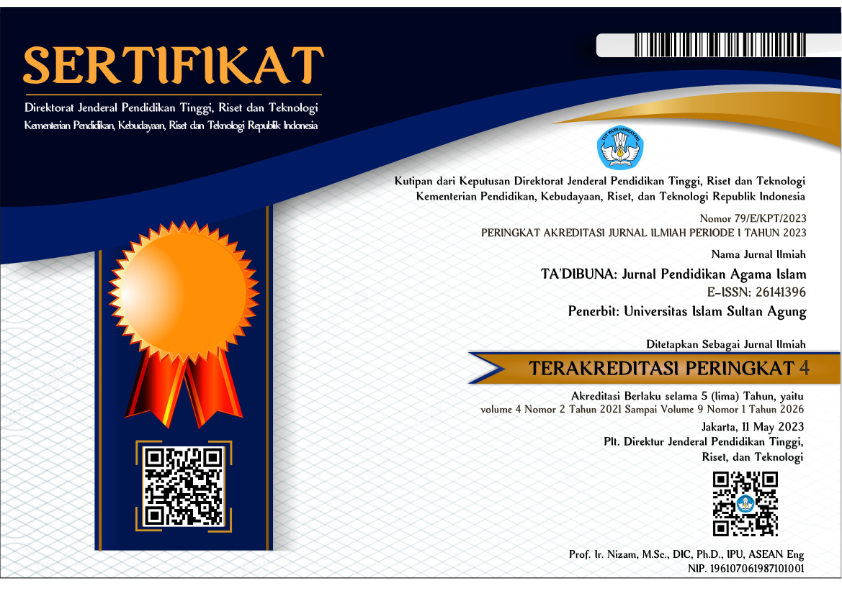The Urgency of Mastering Problem Solving In Islamic Education: a Study of Concepts and Educator Functions
Abstract
Keywords
Full Text:
PDFReferences
Alam, N. A. R. (2019). MODEL PEMBELAJARAN PAI DI LEMBAGA FILANTROPI PENDIDIKAN: Studi di Panti Asuhan Putra Al-Islam Yogyakarta. JSSH (Jurnal Sains Sosial Dan Humaniora), 3(1), 45. https://doi.org/10.30595/jssh.v3i1.2195
Anderson, J. R., & Fincham, J. M. (2014). Extending problem-solving procedures through reflection. Cognitive Psychology, 74, 1–34. https://doi.org/10.1016/j.cogpsych.2014.06.002
Anshori, I. (2021). Problem-Based Learning Remodelling Using Islamic Values Integration and Sociological Research in Madrasas. International Journal of Instruction, 14(2), 421–442. https://doi.org/10.29333/iji.2021.14224a
Azizi Abarghoui, M., Ketabi, S., & Shahrokhi, M. (2021). Relationship between Teaching Experience, Academic Qualifications and In-service Training Courses: The case of Iranian EFL teachers’ use of critical thinking-based teaching strategies. International Journal of Foreign Language Teaching and Research, 9(37), 95–104. https://doi.org/10.52547/jfl.9.37.95
Barham, A. I. (2020). Investigating the development of pre-service teachers’ problem-
solving strategies via problem-solving mathematics classes. European Journal of
Educational Research, 9(1), 129–141. https://doi.org/10.12973/eu-jer.9.1.129
Carmeli, A., Levi, A., & Peccei, R. (2021). Resilience and creative problem-solving capacities in project teams: A relational view. International Journal of Project Management, 39(5), 546–556. https://doi.org/10.1016/j.ijproman.2021.03.007
Chen, C. M., & Chen, C. C. (2010). Problem-based learning supported by digital archives: Case study of Taiwan Libraries’ History Digital Library. The Electronic Library,
(1), 5–28. https://doi.org/10.1108/02640471011005414
Dane, E., Baer, M., Pratt, M. G., & Oldham, G. R. (2011). Rational Versus Intuitive Problem Solving: How Thinking “ Off the Beaten Path†Can Stimulate Creativity. Psychology of Aesthetics, Creativity, and the Arts, 5(1), 3–12. https://doi.org/10.1037/a0017698
Dewey, J. (2008). The School and Society. Michigan: Cosimo Classics.
Ghufron, M. A., & Ermawati, S. (2018). The strengths and weaknesses of cooperative learning and problem-based learning in EFL writing class: Teachers and students’ perspectives. International Journal of Instruction, 11(4), 657–672. https://doi.org/10.12973/iji.2018.11441a
Haryoko, S. (2010). Efektivitas Pemanfaatan Media Audio-Visual Sebagai Alternatif Optimalisasi Model Pembelajaran. Jurnal Edukasi@Elektro, 5(1), 1–10. Retrieved from https://journal.uny.ac.id/index.php/jee/article/view/972
Hendarwati, E., Nurlaela, L., Bachri, B. S., & Sa’ida, N. (2021). Collaborative Problem Based Learning Integrated with Online Learning. International Journal of Emerging Technologies in Learning, 16(13), 29–39. https://doi.org/10.3991/ijet.v16i13.24159
Jumaeva, S. B., Inomov, B. M. U., & Mardonova, R. R. K. (2018). The Problem of Aesthetic Education of Youth on the Basis of Islamic Values in the Context of Globalization. SCIENTIFIC PROGRESS, 1(4), 131–134.
Kandiri, K., & Puadi, H. (2021). KORELASI MODEL PEMBELAJARAN BERBASIS MASALAH (PROBEM BASED LEARNING) DENGAN PEMAHAMAN PAI SISWA DI SMP SUNAN AMPEL SUMBEREJO BANYUPUTIH SITUBONDO TAHUN 2020-/2021. Edupedia : Jurnal Studi Pendidikan Dan Pedagogi Islam,
(2), 107–118. https://doi.org/10.35316/edupedia.v5i2.996
Khalid, M., Saad, S., Abdul Hamid, S. R., Ridhuan Abdullah, M., Ibrahim, H., & Shahrill, M. (2020). Enhancing creativity and problem solving skills through creative problem solving in teaching mathematics. Creativity Studies, 13(2), 270–291. https://doi.org/10.3846/cs.2020.11027
Khalifaturohma, S. H., & Mufida, Z. (2020). MODEL PEMBELAJARAN PROBLEM SOLVING DI PONDOK PESANTREN. Ilmuna: Jurnal Studi Pendidikan Agama Islam, 2(2), 155–171. https://doi.org/10.54437/ilmuna.v2i2.171
Kholid, M. N., Sa’Dijah, C., Hidayanto, E., & Permadi, H. (2022). Students’ reflective thinking pattern changes and characteristics of problem solving. Reflective Practice,
(3), 319–341. https://doi.org/10.1080/14623943.2021.2025353
Kulsum, N. U., & Kristayulita, K. (2019). Student Problem Solving Analysis by Step John Dewey Reviewed from Learning Style. IJECA (International Journal of Education and Curriculum Application), 2(2), 20. https://doi.org/10.31764/ijeca.v2i2.2102
Lutfauziah, A., Al-Muhdhar, M. H. I., Suhadi, S., & Rohman, F. (2020). THE LEARNING METHODS OF PROBLEM SOLVING SKILLS IN ISLAMIC BOARDING SCHOOL: DISCUSSION, EXERCISE, AND MODELING. Jurnal Pena Sains, 7(1), 32–39. https://doi.org/10.21107/jps.v7i1.6811
Mahmud, M., Sugiyono, S., & Fitriyana, F. (2020). Korelasi Fungsi Kepala Sekolah Sebagai EducatorDengan Kompetensi Pedagogik Guru SMA Darussalam Blokagung Tegalsari Banyuwangi. Jurnal Manajemen Pendidikan Islam Darussalam, 2(1), 139. https://doi.org/10.30739/jmpid.v2i1.602
Maulyda, M. A., Hidayati, V. R., Rosyidah, A. N. K., & Nurmawanti, I. (2019). Problem- solving ability of primary school teachers based on Polya’s method in Mataram City. Pythagoras: Jurnal Pendidikan Matematika, 14(2), 139–149. https://doi.org/10.21831/pg.v14i2.28686
Nasrullah, N., Johar, R., & Munzir, S. (2019). Kemampuan Pemecahan Masalah dan Keyakinan Calon Guru dalam Menyelesaikan Soal Pemecahan Masalah. Jurnal Pendidikan: Teori, Penelitian, Dan Pengembangan, 4(3), 346. https://doi.org/10.17977/jptpp.v4i3.12110
Nuryana, Z., Nurcahyati, I., Rahman, A., Setiawan, F., & Fadillah, D. (2020). The challenges and solutions of teachers’ problems to achieve education golden era. Universal Journal of Educational Research, 8(2), 583–590. https://doi.org/10.13189/ujer.2020.080230
Prasad, M. (2021). Pragmatism as Problem Solving. Socius, 7. https://doi.org/10.1177/2378023121993991
Sari, R. M., Sumarmi, Astina, I. K., Utomo, D. H., & Ridhwan. (2021). Increasing Students Critical Thinking Skills and Learning Motivation Using Inquiry Mind Map. International Journal of Emerging Technologies in Learning, 16(3), 4–19. https://doi.org/10.3991/ijet.v16i03.16515
Satriani, S., & Wahyuddin, W. (2019). Implementasi Model Pembelajaran Creative Problem Solving (CPS) Untuk Meningkatkan Kemampuan Pemecahan Masalah Mahasiswa. Jurnal Derivat: Jurnal Matematika Dan Pendidikan Matematika, 5(1),
–81. https://doi.org/10.31316/j.derivat.v5i1.149
Seibert, S. A. (2021). Problem-based learning: A strategy to foster generation Z’s critical thinking and perseverance. Teaching and Learning in Nursing, 16(1), 85–88. https://doi.org/10.1016/j.teln.2020.09.002
Simon, H. A. (1980). Problem solving and education. Problem Solving and Education: Issues in Teaching and Research, 81–96.
Sopian, A. (2016). TUGAS, PERAN, DAN FUNGSI GURU DALAM PENDIDIKAN.
Raudhah Proud To Be Professionals : Jurnal Tarbiyah Islamiyah, 1(1), 88–97. https://doi.org/10.48094/raudhah.v1i1.10
Wali, M., & Ahmad, L. (2021). Computer Assisted Learning (CAL): A Learning Support System Solution. Webology, 18(1), 299–314. https://doi.org/10.14704/WEB/V18I1/WEB18090
Wartono, W., Batlolona, J. R., & Mahfi, R. M. (2019). PENINGKATAN KEMAMPUAN PEMECAHAN MASALAH FISIKA DENGAN MODEL PEMBELAJARAN INQUIRY-DISCOVERY. EDUSAINS, 11(2), 242–248. https://doi.org/10.15408/es.v11i2.8574
Zaini, M. (2021). STRENGTHENING THE QUALITY OF HUMAN RESOURCES (HR) IN IMPROVING THE QUALITY OF ISLAMIC EDUCATION IN MADRASAH. Didaktika Religia, 9(1), 81–100. https://doi.org/10.30762/didaktika.v9i1.3164
DOI: https://dx.doi.org/10.30659/jpai.6.1.68-81
Refbacks
- There are currently no refbacks.
Ta’dibuna: Jurnal Pendidikan Agama Islam is published by the Master Program of Islamic Education, Faculty of Islamic Studies, Universitas Islam Sultan Agung (UNISSULA), Indonesia.
Jl. Raya Kaligawe Km. 4, PO BOX 1054/SM, Semarang, Indonesia 50112
Email: jurnaltadibuna@unissula.ac.id








